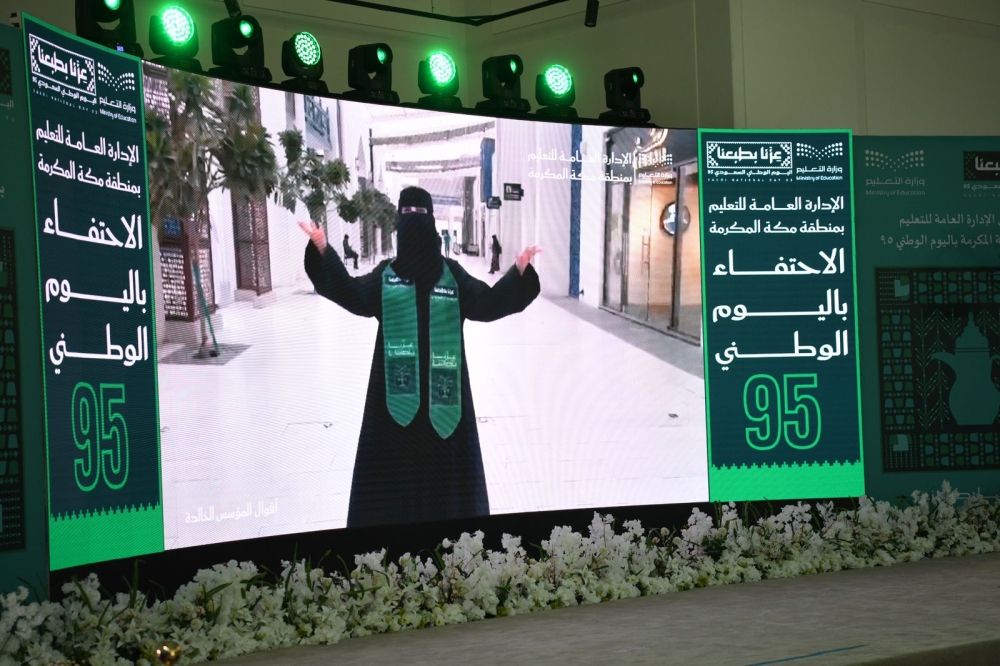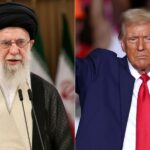The General Administration of Education in Makkah organized a celebration of the 95th Saudi National Day this Thursday morning at Ali bin Abi Talib Secondary School.
The event was held under the patronage of the Advisor to the Custodian of the Two Holy Mosques, the Governor of the Makkah Region, and was attended by the Secretary of the Holy Capital, the Undersecretary of the Ministry of Education for Legal Affairs and Policies, the Director General of Education in the Makkah Region, and a number of directors of government sectors and educational leaders.
Saudi National Day 95
In a speech delivered by the Director General of Education in the Makkah Region, he extended the highest congratulations to the Custodian of the Two Holy Mosques, King Salman bin Abdulaziz Al Saud, and to the Crown Prince, Prime Minister, affirming that this cherished anniversary represents a national occasion to renew pride, loyalty, and belonging.
He pointed out that this year’s slogan, “Our Glory is Our Nature,” translates a genuine truth of the nation’s identity and its people.
Various National Segments
He clarified that education is not merely the imparting of knowledge but is the building of identity and the creation of a generation’s consciousness that combines authenticity and modernity, based on its firm values while competing with its knowledge and achievements.
The celebration included the operetta “Our Glory is Our Nature” with the participation of a select group of male and female students, along with various national segments that expressed feelings of loyalty and pride. The event concluded with the Saudi Ardah performance with the participation of guests and attendees.
Makkah
Makkah, also spelled Mecca, is the holiest city in Islam, located in Saudi Arabia. It is the birthplace of the Prophet Muhammad and the site of the Kaaba, the most sacred shrine in Islam, which Muslims believe was built by Abraham and his son Ishmael. Every year, millions of Muslims perform the Hajj pilgrimage to Makkah, a religious duty that is one of the Five Pillars of Islam.
Ali bin Abi Talib Secondary School
Ali bin Abi Talib Secondary School is an educational institution named in honor of Ali ibn Abi Talib, a central figure in early Islamic history and the fourth caliph. While specific details about the school’s founding are not widely documented, its name reflects its purpose of providing education within an Islamic cultural and ethical framework. It serves as a modern secondary school dedicated to the academic and moral development of its students.
Custodian of the Two Holy Mosques
“Custodian of the Two Holy Mosques” is a royal title used by the King of Saudi Arabia, signifying his responsibility for Islam’s two holiest sites: the Al-Masjid al-Haram (the Grand Mosque) in Mecca and the Al-Masjid an-Nabawi (the Prophet’s Mosque) in Medina. The title was officially adopted by King Fahd in 1986, replacing the previous title of “His Majesty,” to emphasize the Islamic and service-oriented role of the Saudi monarch. It reflects the Kingdom’s deep historical and religious significance as the birthplace of Islam and the guardian of the destinations for the annual Hajj pilgrimage.
Makkah Region
The Makkah Region is the western province of Saudi Arabia and home to Islam’s holiest city, Mecca (Makkah). It is the birthplace of the Prophet Muhammad and the site of the Kaaba, towards which Muslims worldwide pray. For over 1,400 years, it has been the spiritual center of Islam and the destination for the annual Hajj pilgrimage.
Holy Capital
The term “Holy Capital” most commonly refers to the city of Kyoto, which served as the official capital of Japan for over a thousand years (794-1868 CE). Founded as Heian-kyō, it was the center of imperial power and Japanese culture, renowned for its thousands of Shinto shrines and Buddhist temples. Its historic monuments, such as the Kinkaku-ji (Golden Pavilion), have led to its designation as a UNESCO World Heritage site.
Ministry of Education
The Ministry of Education is a government department responsible for national education policy, schools, and curriculum standards. Its history is tied to the development of public education systems, which many countries formally established in the 19th century to promote literacy and civic values. Today, such ministries work to ensure educational access, quality, and alignment with economic and social goals.
Saudi National Day
Saudi National Day is an annual public holiday in Saudi Arabia celebrated on September 23rd. It commemorates the 1932 decree by King Abdulaziz Al Saud that unified the regions of the Hejaz and Nejd, establishing the modern Kingdom of Saudi Arabia. The day is marked by national festivities, including fireworks, cultural events, and displays of the country’s green flag.
Saudi Ardah
Saudi Ardah is a traditional group dance that is recognized as a significant cultural symbol and a UNESCO Intangible Cultural Heritage of Humanity. Historically, it was a war dance performed by tribes before battle to display strength and unity. Today, it is a centerpiece of national celebrations, featuring drummers, poets, and dancers moving in synchronized lines while carrying swords.






